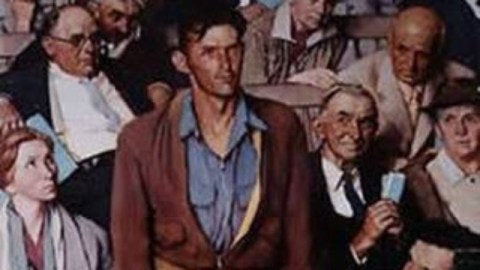NOAA Video Town Hall Series on the Climate Change Challenge

This week, NOAA’s Climate Service and Climate Watch magazine launched a video short course and lecture series featuring a diversity of world class experts explaining the major scientific, social, and ethical challenges related to climate change. I was honored to be able to contribute to the series with a lecture focused on new directions for climate change communication and public engagement.
The series was organized by David Herring, NOAA’s Director of Education and Communication and held in Virginia as part of George Mason University’s lifelong learning program. Lectures and speakers in the series include:
The State of the Climate; Deke Arndt, NOAA’s National Climatic Data Center
Global Climate Change Impacts in the U.S., Anthony C. Janetos, Joint Global Change Research Institute
Limiting the Magnitude of & Adapting to Future Climate Change; Robert Fri, World Resources Institute
Climate Change Communication: Focusing on Public Engagement; Dr. Matthew Nisbet, American University
Below is the description for my talk which draws on studies familiar to readers of this blog including last year’s Climate Shift report and the pioneering “Six Americas of Global Warming” research led by collaborators Edward Maibach (GMU Center for Climate Change Communication) and Anthony Leiserowitz (Yale Project on Climate Change).
Social scientist and communication expert Mathew Nisbet talks about the state of public climate literacy today. What actions are people likely or not likely to take, and why? How might scientists better engage the public in critical decision-making forums? Constant debates about whether or not global warming is really happening have grown stale and miss the point entirely. Shouldn’t we be talking about how society can leverage climate science in ways that promote economic growth; save lives and valuable natural resources; and create new markets for jobs, products, and services?
Additional Online Lectures Focusing on Climate Change Communication
There are several other excellent online presentations and lectures offering complementary perspectives on climate change communication. A leading resource is the presentation by the New York Times’ Andrew Revkin “Conveying the Climate Change Story,” given last year at Google HQ in Mountain View, California as part of the Google Science Communication Fellows program.
For another excellent focus on communication challenges and new directions, see scientist-filmmaker Randy Olson’s lecture “Dude, Where’s My Climate Change Movement?” delivered earlier this year at the World Wildlife Federation’s Fuller Symposium.
For an important perspective on climate policy and the connection to communication, see this Q&A talk that I did last year with the University of Colorado’s Roger Pielke Jr here at American University, excerpt below with other excerpts and a write up here.
See Also:
Reading List for American University Course on Science and Environmental Communication
Climate Shift Report: Introduction and Overview
What’s Next for Science Communication? Promising Directions and Emerging Best Practices
Understanding Public Opinion and Participation in the Climate Change Debate
Reframing Climate Change as a Public Health Problem
Science Journalists Online: Shifting Roles and Emerging Practices
Study Maps Relationship Between Cable News and Climate Change Perceptions
America’s Peak Oil Perceptions
How Scientists View the Public, the Media,and the Political Process





